Each month we select a Library of the Month to honor libraries who have been using our library technologies in interesting and innovative ways, from creating well-curated reading lists with Talis Aspire to driving usage of library content with Lean Library.
The winning library will be awarded a prize to share amongst their team or a donation to a charity of their choice as a way for us to say thank you.
Concordia University Irvine (CUI) is a private, nonprofit Christian university located in Irvine, California, United States. They educate nearly 5,000 students on campus and online, and their alumni network has grown to over 25,000 worldwide.
We chose CUI as June’s Library of the Month as one of the first institutions to turn on our newly launched Lean Library Workspace feature to support its students across the entire research journey – from content discovery and access through to reference management, project collaboration and authoring work.

We asked Regina Powers, Library Director at CUI to tell us more about the university library and Lean Library:
“In fall of 2024, we set up Lean Library as a fresh way to connect learners to content. Concordia students appreciated the flexibility of being able to conduct research outside of the library’s search box. We have only just begun demonstrating the functionality of the new all-in-one Lean Library Workspace. But already students, especially graduate students, are excited about how much time they will save using Workspace to find, organize, annotate, and cite their research and include it in their writing projects. We plan to introduce Lean Library Workspace to faculty as a potential formative assessment tool. When added to a student’s Workspace project, faculty will be able to view and/or collaborate on their students’ research progress. (There will be no need to wonder if AI has done the work. Instructors will be able to view the student-selected articles linked up to their Workspace project.)
Concordia University Irvine is honored to be recognized as Library of the Month. We are beyond grateful to be partnering with Technology from Sage now and into the future.”
Discover our previous winners below:
Could your library be next?
Join us next month to see who’s won.
Lean Library Case Study: Higher Colleges of Technology June 18, 2025
Higher Colleges of Technology (HCT) is the UAE’s largest applied higher education institution, renowned for its leadership in applied and technological education. The university faced a common challenge across university libraries: ensuring seamless access to their extensive library resources across diverse online platforms. With students and faculty increasingly conducting research online, HCT needed a solution that brought library content directly to users wherever they were working.
HCT chose Lean Library to promote library resources throughout the research workflow to students via the Lean Library browser extension. This streamlines student access to library holdings and Open Access content and takes library services and guidance to students at their point of need.

After implementing Lean Library, HCT experienced a significant transformation in how their academic community accessed and engaged with library resources. Lean Library’s browser extension acts as a direct bridge between users and the library’s digital holdings, surfacing content and support exactly when and where it’s needed, whether the student begins their research on Google Scholar, PubMed, Wikipedia, or even ChatGPT.
“Lean Library has completely streamlined our users’ research workflows. Our students no longer waste time navigating complex access routes; instead, they’re instantly connected to full-text articles, eBooks, and licensed materials.”
Chrisa Karakasidou, Act. Asst. Library Manager, HCT
A key feature that has greatly benefited HCT is Lean Library’s Assist messages which are targeted, customizable notifications that appear contextually to guide users directly within their workflow or promote relevant library services.
Chrisa added: “The Assist messages allow us to provide timely support directly in the users’ workflow, whether reminding them about resource availability or drawing them back to the Library homepage, where they can contact the team directly using our integrated messaging service. This proactive approach has increased engagement and reduced barriers to accessing our collections.”
Lean Library has also increased visibility and usage of HCT’s licensed content significantly.
“Since launching Lean Library, we’ve seen a measurable rise in resource downloads and database engagement. It’s clear that providing targeted library messages and simplifying access empowers our academic community.”
Mostafa Osman, System Librarian, HCT
One standout benefit for HCT was Lean Library’s integration with Open Access repositories like Unpaywall and DOAB , which redirected students around paywalls to millions of freely available articles and eBooks, saving students money.
This feature not only enhanced access to papers for students but also contributed to library budget savings by reducing reliance on costly document delivery.
HCT Library has recently used the Lean Library integration to put LibGuides directly into student workflows. HCT can now offer timely support and personalized assistance without students needing to leave their research environment. This would lead to improved student satisfaction and a stronger connection between library services and academic success.
HCT is excited about rolling out Lean Library Workspace, formerly Sciwheel, an end-to-end research tool that integrates with the Lean Library browser extension. They believe this will increase uptake of Lean Library by enabling students to not only to find easier routes to access content but also to save articles, books, and other resources to their personal Workspace account.
Students will then be able to create in-text citations and bibliographies seamlessly, further supporting academic writing and research efficiency and providing students with an uninterrupted research experience.
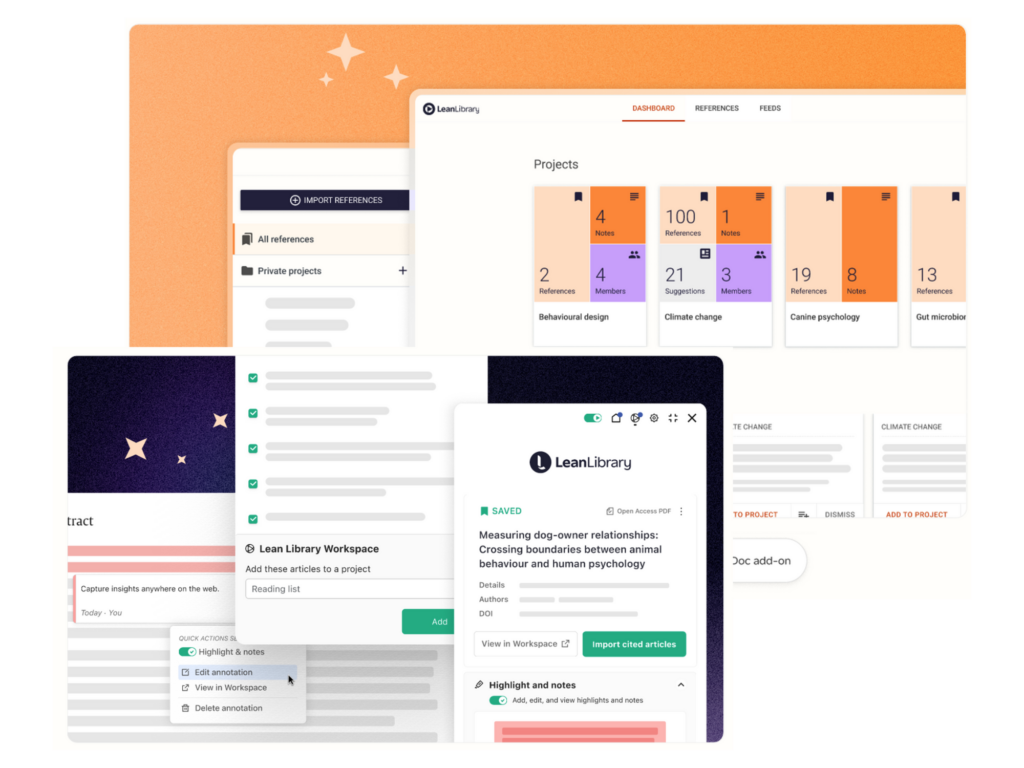
By partnering with Lean Library, Higher Colleges of Technology has empowered its students and faculty with efficient, user-friendly access to essential resources, transforming the research experience and maximizing the impact of library services across campus.

Find out more about Lean Library.
If you’d like to hear more or receive a product demo, get in touch.
10 Key Findings on Students, AI and the Library from Librarian Futures Part IV June 17, 2025We recently launched Librarian Futures Part IV report: Librarian Leadership on the AI Frontier. The report draws on global surveys of 1000 students and 300 librarians, and uncovers a complex relationship between confidence, capability, and trust in the academic use of AI.
The report explores how artificial intelligence (AI) is reshaping the academic research journey—and the vital role librarians can play in guiding its responsible use.
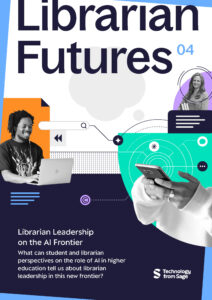
Read on for a sneak peek of ten of the key findings from Librarian Futures Part IV…
AI clearly now has a significant role on the student workflow but has not necessarily changed it beyond recognition. Instead, it appears that AI has simply expanded the pool of resources available for students beginning their research.
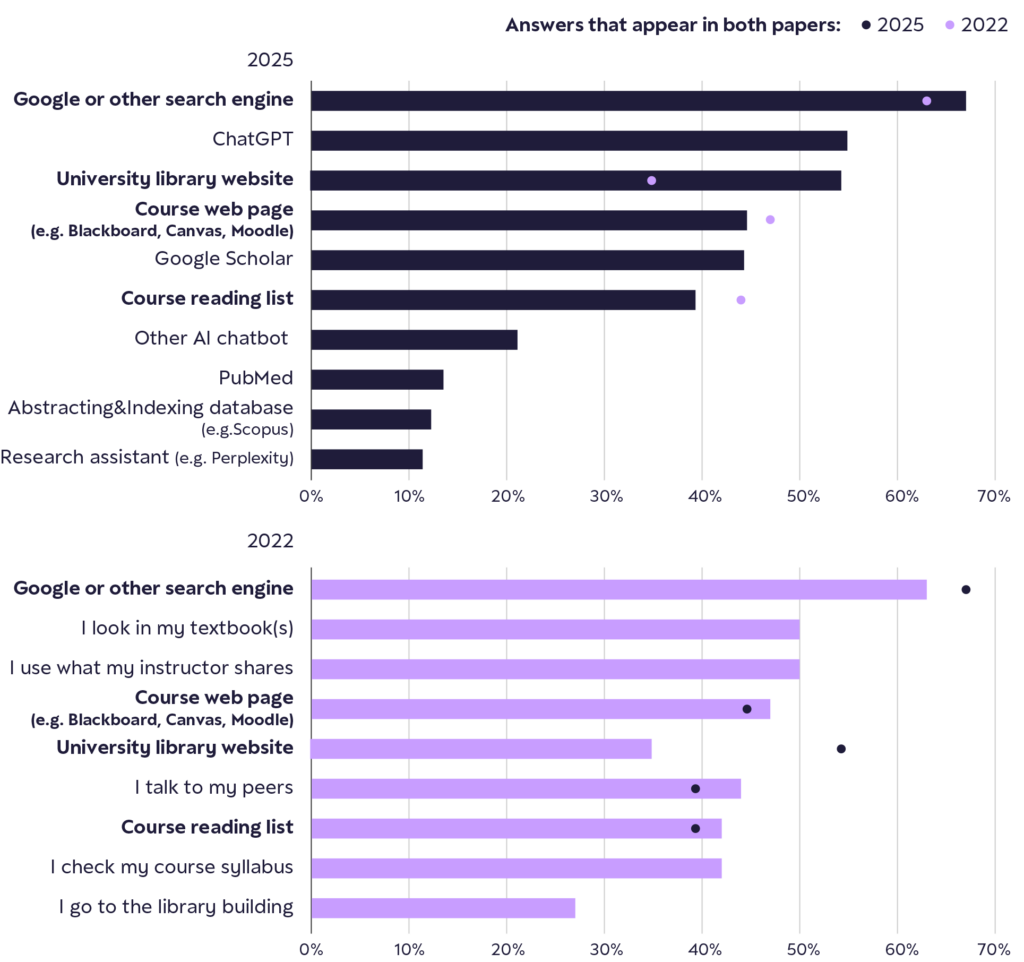
Figure 1. Data from Librarian Futures Part 2 compared with newly collected data (n=930) on: Student research habits.
Student use of AI at present is concentrated on a small pool of AI tools, rather than integrating it into every facet of their studies.
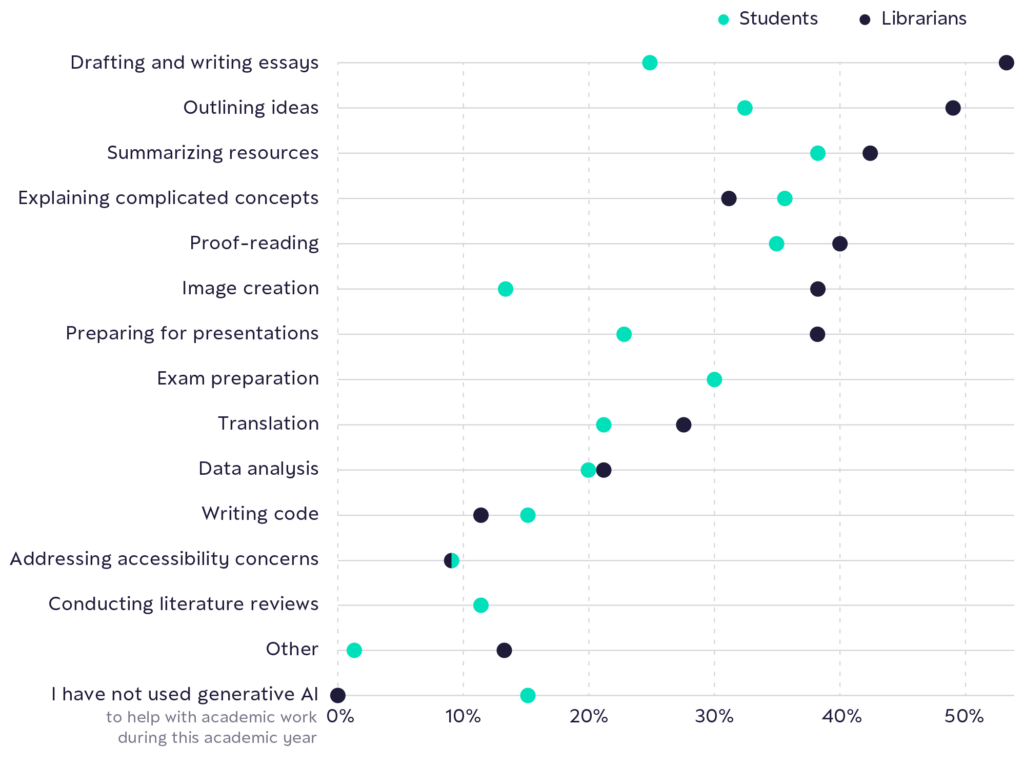
Figure 2. Student (n=912) and librarian (n=235) responses to the question: How have you used generative AI to help with academic work during this academic year?
Over half of students feel overwhelmed regularly (19% very often, 38% often). The effects of being overwhelmed are various. Half of students (50%) report that they either pay less attention in class or stop attending class completely.

Figure 3. Student responses (n=902) to the question: At your institution, who would you look to for guidance on AI use?
Although more were enthusiastic than not, significant numbers of both students and librarians were either ambivalent about the prospect or actively opposed. This suggests a looming gap in practice and, therefore, attainment.
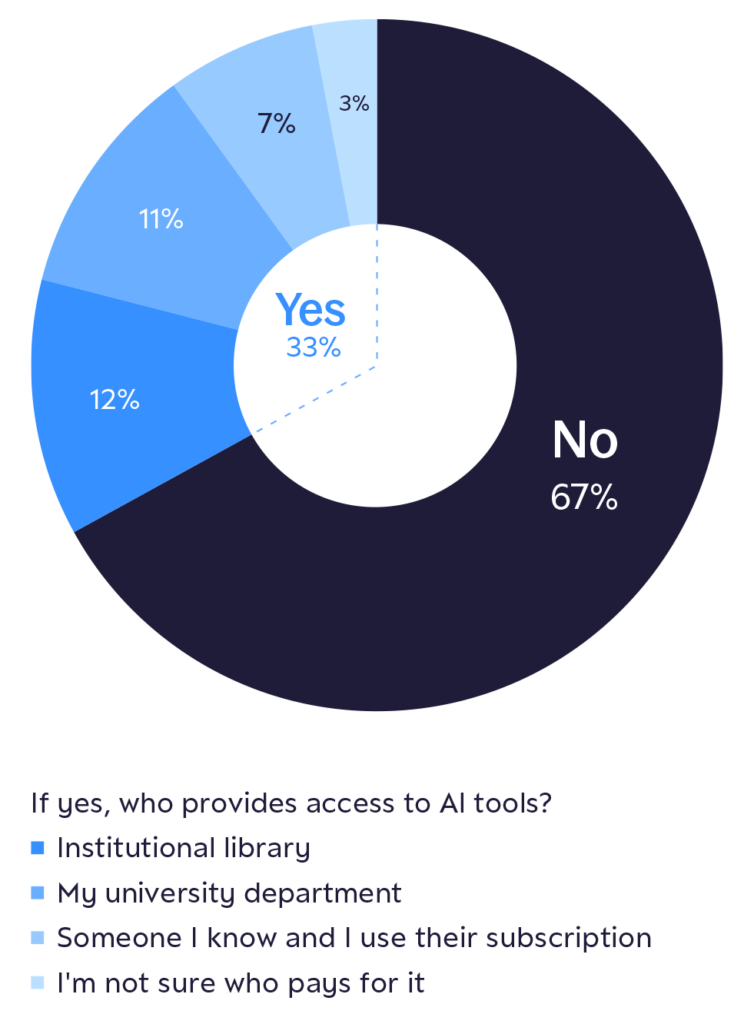
Figure 4. Student (n=911) responses to the question: Have you had access to any AI tools purchased on your behalf to help with academic work during this academic year?
Download Librarian Futures Part IV to discover more noteworthy insights regarding how the library to embed themselves into emerging AI workflows and the complementary skills librarians can develop to ensure the library is an authoritative voice on AI.
Share your thoughts about the findings in the new Librarian Futures Part IV report on LinkedIn and Bluesky.
What happened at Talis Insight APAC 2025? June 3, 2025
If you haven’t heard of Talis Insight APAC before, it’s our free, two-day event for library professionals to gather, network and discuss the role of Talis Aspire resource lists, sharing ideas for best practice.
This year’s event was hosted by Griffith University with 35 attendees across the two days. It was an insightful two days with lots of ideas shared, collaboration and networking.
Read on for a recap of Talis Insight APAC 2025…

The event began with introductions and a keynote address by Nicola Langford, International Sales Director for Technology from Sage. Nicola thanked our wonderful hosts, Griffith University, for helping us put the event together in such a fabulous location: The Ship Inn in Brisbane.
We then heard from Sandra Kalms, Manager Scholarly Resource Services at Griffith University, truly kicked things off by delivering an acknowledgement of country which connected the significance of Brisbane’s South Bank location to local First Nations people and our opportunity to build on this by learning, gathering and exchanging information.
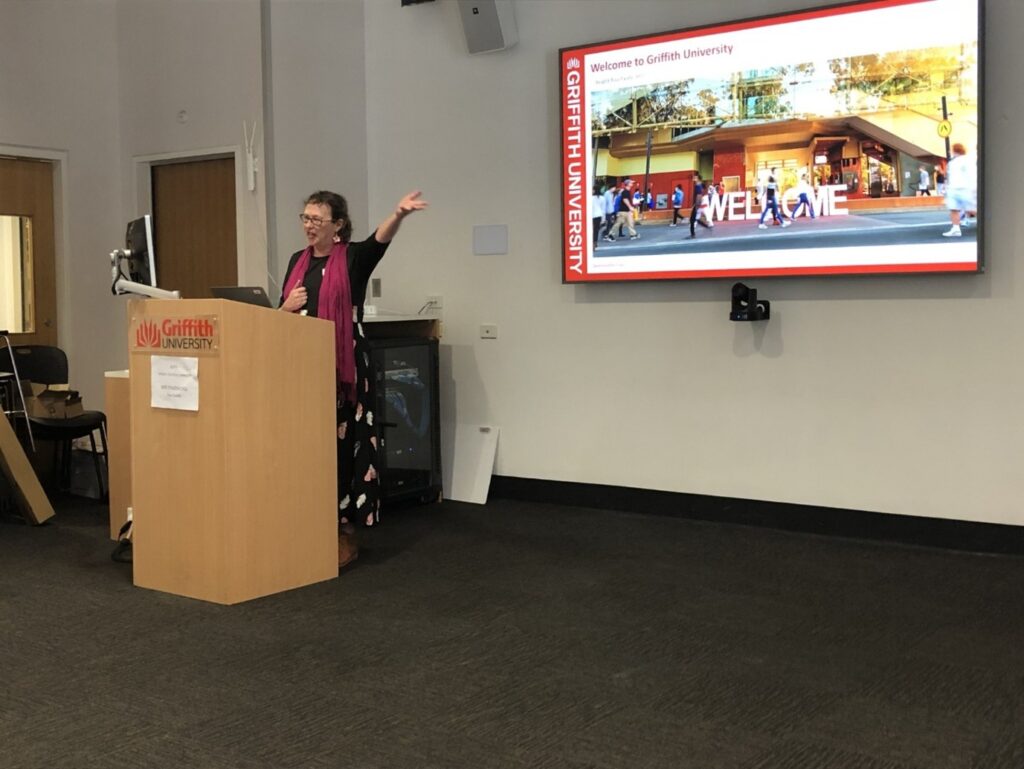 Sandra also summed up the aims of the conference superbly:
Sandra also summed up the aims of the conference superbly:
Finally, she introduced our very first Insight APAC theme song! It was created by Suno AI, and you can listen to it here.
Our next presenter was Scott Gibbens, Head of Product at Technology from Sage. Scott joined us in the early hours of the UK morning to present on the 2025 Talis Aspire roadmap highlights and upcoming improvements for 2025/2026. Throughout the session, we heard plenty of questions from attendees around copyright, open access, tagging and Talis Engage. You can read our blog post about the new Talis Engage feature within Talis Aspire here.
After a coffee break, our Talis Aspire User Group representatives Natalie Hull from The University of Queensland and Bex Carruthers from Deakin University took us through an icebreaker activity of which tested everyone’s book knowledge.
Next up we had Isabelle Laskaris, Support Consultant at Technology from Sage, who presented on User Metrics and Trends. Looking across our 13 APAC institutions, Isabelle took us through the data around the top 10 vendors across reading lists, LTI usage, student reading intentions, the proportion of electronic items and academic edits across reading lists in the region.
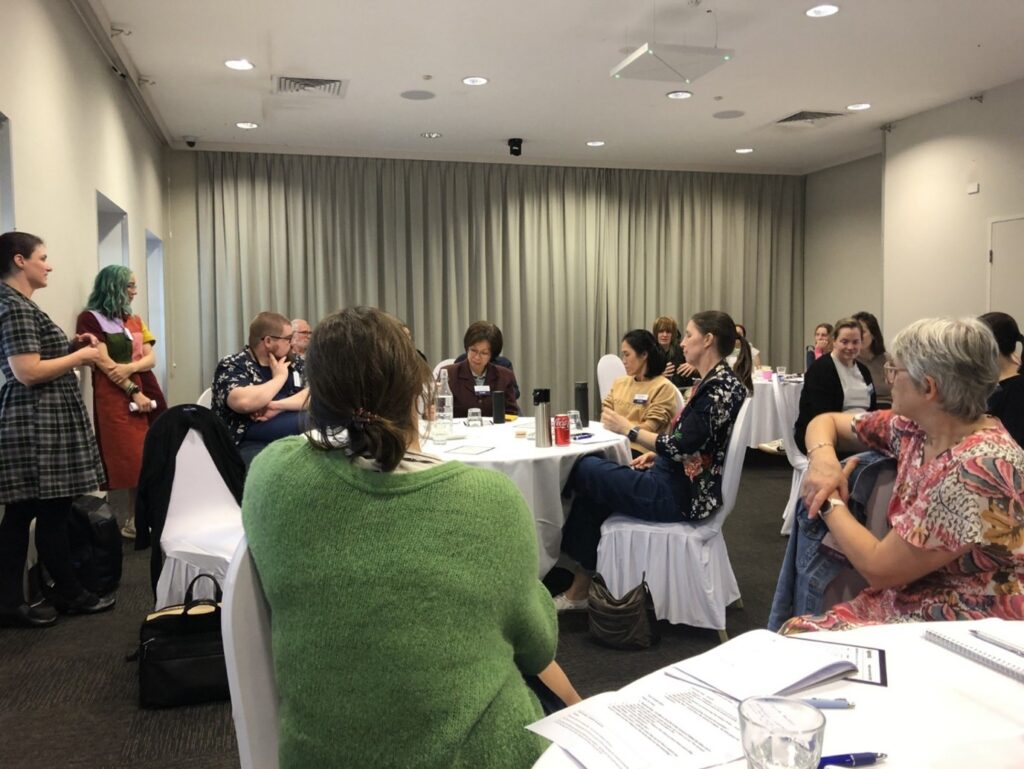
After lunch, we had our user group discussion hosted by TAUG reps Natalie and Bex. This is one of the cornerstone sessions of Insight APAC, with lots of engaging discussion amongst everyone in the room. This year, AI dominated the conversation (surprise, surprise!) with lots of sharing and questioning around best practices and the way forward. We also touched on issues such as eBook subscription models and reading list length.
Our final session of the day was hosted by Nicola Langford who gave an overview of Technology from Sage’s three previous whitepapers and unveiled key findings from the brand-new Librarian Futures Part IV: Librarian Leadership on the AI Frontier. If you haven’t yet downloaded the report, you can do so here.
After a quick welcome from Nicola, we kicked off Day Two of the event with a presentation from Hannah Armitage, Discovery UX Specialist at The University of Melbourne. Hannah joined us virtually to present on “user empathy” and the library’s quest to understand and transform the online library experience. Hannah shared how the library undertook a project intended to really get to know their users and how building a series of archetypes around their users has helped the library team to empathize and better serve their diverse user communities.
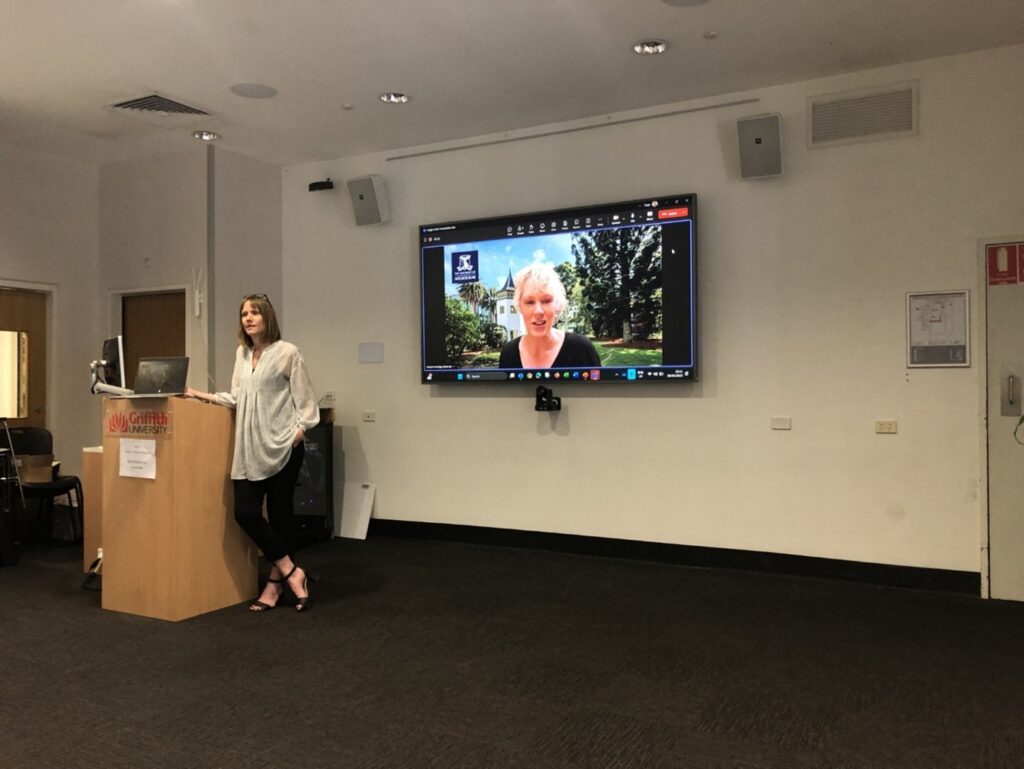
Next up, Jamie McDonald, Reading Lists and Resource Sharing Specialist at La Trobe University, showed us La Trobe’s Reading List Digital Usage Dashboard, built using Power BI and Advanced MIS data. Intended to spark conversations with academics around the reading list resources that have been engaged with, Jamie took us through the process of creating the dashboard including the challenges and limitations and hopes for the future. Jamie also then took us through how he uses Talis API’s to retrieve valuable data from reading lists and to update, create and remove resources and lists.
Our next session was hosted by Grace Fu, Librarian and Katrina Henderson, Business Librarian (both from Griffith University) who spoke about their cross-team efforts to transition 100% of required and recommended readings online before 2026. Grace and Katrina both spoke about their respective roles and their team roles within the project and how they prepared the data, communicated with publishers and academics, and used tools such as Power BI and Excel to help them in their efforts.
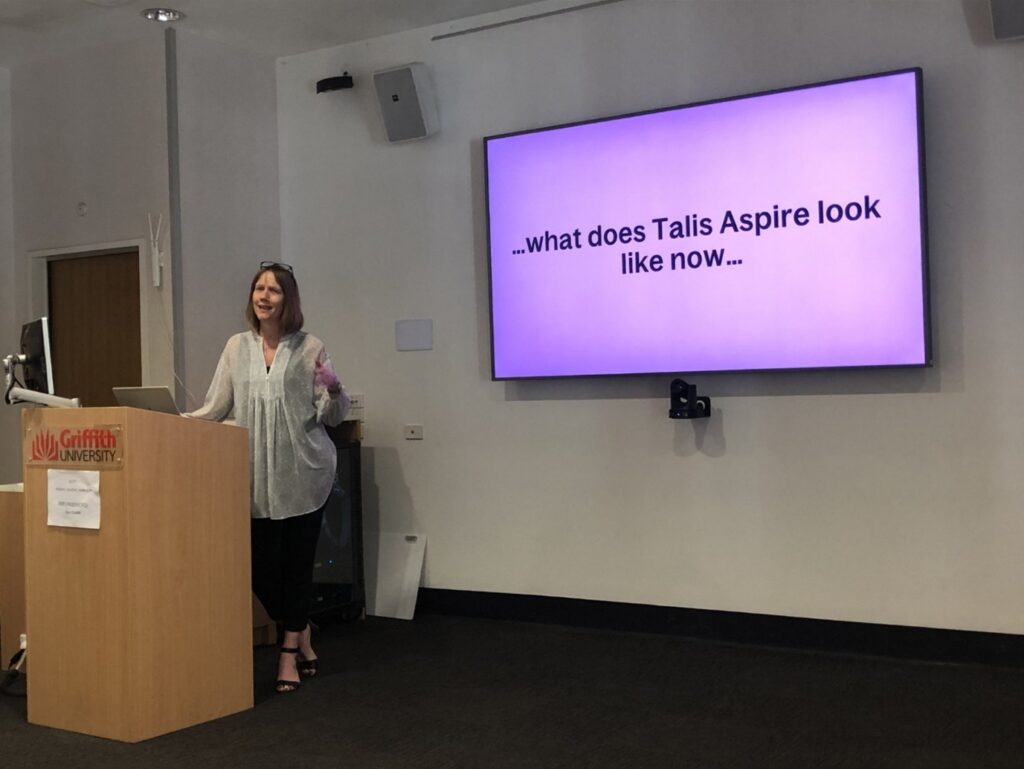
After a coffee break, Nicola Langford challenged the room to imagine it’s 2030 and posed the questions: What would your ‘dream’ resource list system look like? What major innovations would you include? How would it evolve to help you deliver your strategic objectives? The challenge was to ‘think big.’
We then allowed each table time to think about their answers and report back to the rest of the room. There were some fascinating and valuable suggestions ranging from using AI to build reading lists via content in the LMS to more guided student and academic usage of readings lists through features such as information on length of reading list time and a traffic light system to indicate which resources are and are not used. These contributions have been delivered to the Technology from Sage Product team.
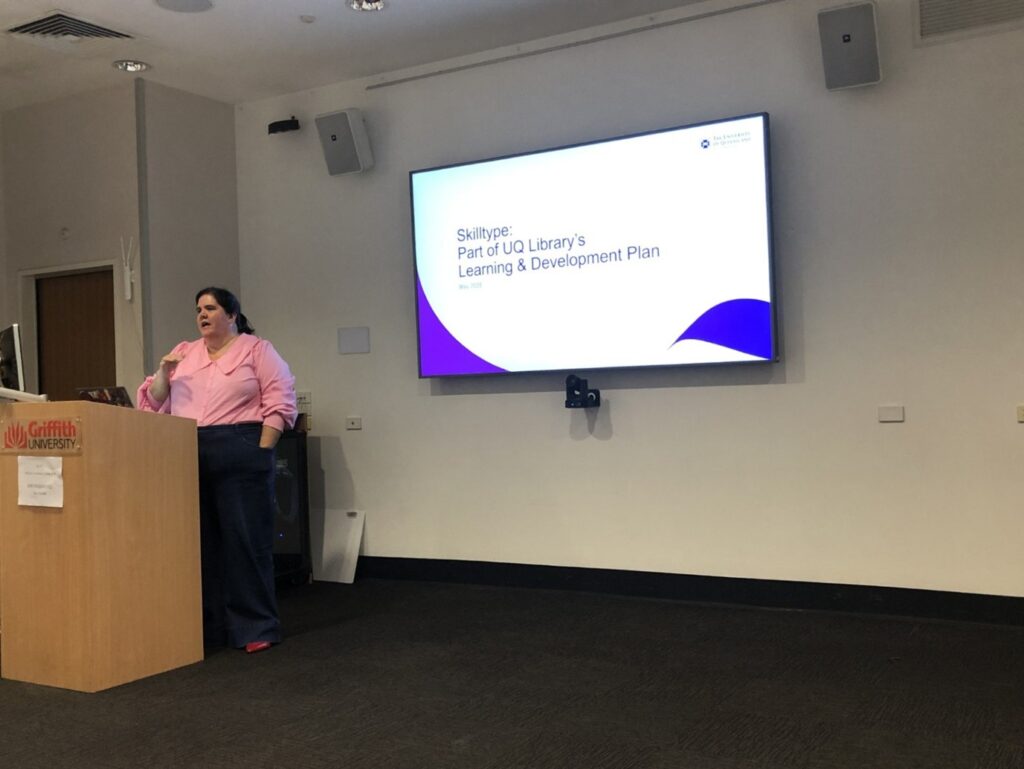
After lunch, Anna Lagos, Associated Director, Operations, Technology and Strategy from The University of Queensland joined us to discuss the university’s implementation of Skilltype. Skilltype is a learning platform with thousands of resources organized by skills and development needs which will help UQ to meet their objectives around People and Culture commitments. Anna provided a live demonstration of the Skilltype platform and discussed how the insights the platform offers might help the library decide what skill areas to focus on.
Our final session was hosted by Nicola Langford who went through the student-specific responses around AI in the latest Librarian Futures whitepaper: Librarian Leadership on the AI Frontier. We had a lengthy discussion around the fact that 45% of students said that they were “cautious and careful” in their approach to AI in their academic work and what that might mean for students, academics and libraries alike.
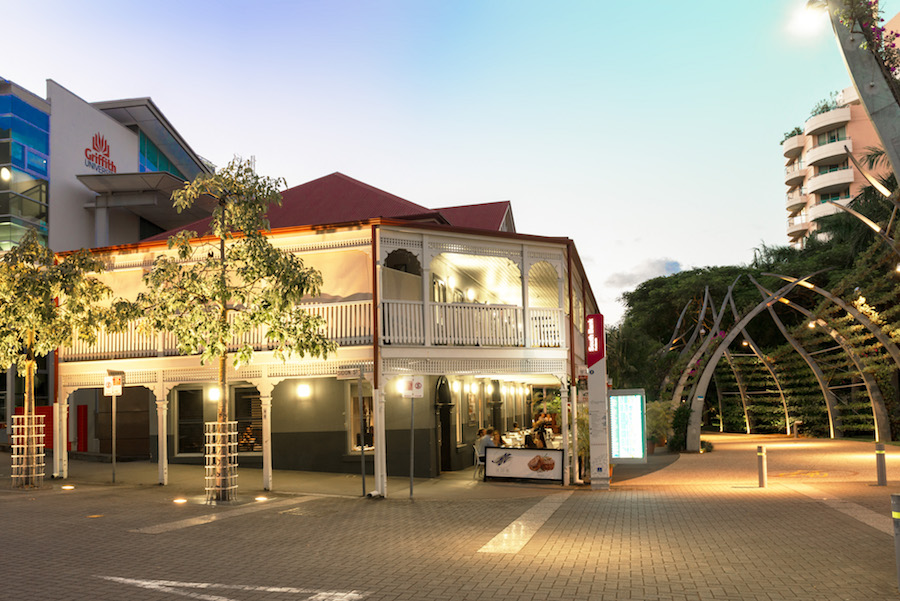
For our parting words, we thanked Griffith University and all their library team for hosting the event and all our speakers for participating and sharing their knowledge. We had a great time and hope the spirited conversations, discussion and knowledge sharing can continue throughout the year and beyond.
Don’t forget to check out the AI-generated theme song Sandra created, and the Insight Asia-Pacific 2025 reading list put together by Neil Cotter from Griffith University. We’re already looking forward to Insight Asia-Pacific 2026…
Congratulations to our May Library of the Month, Griffith University! May 29, 2025Each month we select a Library of the Month to honor libraries who have been using our library technologies in interesting and innovative ways, from creating well-curated reading lists with Talis Aspire to encouraging uptake of the Lean Library browser extension amongst their students. We’re also appreciating the intensive work of librarians in curating these technologies and improving learning outcomes for their students.
The winning library will be awarded a prize to share amongst their team or a donation to a charity of their choice as a way for us to say thank you.
Griffith University is a public research university in South East Queensland on the east coast of Australia. Opening in 1975, the university now have more than 45,000 students, and their community spans five campuses across South East Queensland, plus their Digital campus.
We’ve awarded them our Library of the Month Award for May, as Griffith University have been great advocates of Talis Aspire and long-standing users of the resource list management software. Griffith University have also collaborated with us on user group events, and are even hosting this year’s Insight Asia Pacific event at their Brisbane City campus.

Discover our previous winners below:
Could your library be next?
Join us next month to see who’s won.
New Technology from Sage Report Explores Librarian Leadership in the Age of AI May 20, 2025Technology from Sage has published the fourth instalment in its acclaimed Librarian Futures series: Librarian Leadership on the AI Frontier. The report explores how artificial intelligence (AI) is reshaping the academic research journey—and the vital role librarians can play in guiding its responsible use.
Drawing on global surveys of over 1,000 students and 300 librarians, the findings uncover a complex relationship between confidence, capability, and trust in the academic use of AI. While over half of the students reported using AI tools like ChatGPT in their research, just 8% say they’ve received support from their librarian in doing so. This presents both a challenge and an opportunity: students overwhelmingly trust their librarians, with more than half saying they’d feel more confident using AI tools if recommended by them.

Improving Student Accessibility: Announcing Talis Aspire’s First Further Education Partner, Newcastle College April 28, 2025
Newcastle College is partnering with Technology from Sage to implement Talis Aspire as its integrated resource list management system of choice. This offers students studying across degree and foundation level courses access to library holdings via Talis Aspire. With this implementation, Newcastle College hopes to improve the student experience and accessibility by ensuring that every Higher Education (HE) course (levels 4-7) has an associated resource list.
Talis Aspire is an online resource list management system which connects faculty and students to library holdings directly within their course resource lists. The system seamlessly integrates with all library technology ecosystems, offering a holistic view of course material needs and keeping the library at the heart of teaching and learning.
As a Further Education (FE) institution with degree-awarding status, Newcastle College chose Talis Aspire as a curriculum-focused platform to guide students to relevant and available resources. As it welcomes students with varying levels of qualifications, it is incredibly vital to build upon its students’ academic reading skills to prepare them for future careers or additional study. By simplifying resource management with the adoption of Talis Aspire, students will have simplified access to course materials, reduced costs, and will be able to navigate clearly structured resource lists for their studies.
The partnership marks a significant step in Newcastle College’s commitment to delivering its mission and the objectives of all of NCG’s colleges’ strategic plans. Newcastle College’s ambition is to achieve TEF Gold status by 2030. By growing HE provision year-on-year, there’s a need to provide an outstanding digital environment and ensure students are seamlessly connected to library holdings.
Helen Harpin, Library Coordinator at Newcastle College, and Deputy Manager of the TEF Resources Strand for NCG commented…
“We are really excited to partner with Talis Aspire to give our students the best experience possible, which is at the heart of our library offer at Newcastle College and NCG.
Talis will facilitate greater communication and collaboration between the library service and curriculum staff, streamlining and simplifying current processes and supporting the library in its acquisition procedures, ensuring an accurate and viable collection for all.
Talis will directly link students to resources via our Library Catalogue and online discovery tools, which will help overcome difficulties that they currently experience, ensuring clarity and availability of resources.
We feel this is an essential step towards providing high quality resources and the most effective service for our staff and students, and we look forward to seeing our students positively benefit from it.”
Newcastle College plans to launch Talis Aspire by September 2025, once training has been delivered to colleagues.
Talis Aspire fully integrates with library systems, working seamlessly with the library’s Koha library management system and the Summon discovery layer. This was a bonus for the library staff as it meant the implementation process required no additional set up.
By implementing Talis Aspire Newcastle College hopes to enhance the student experience by streamlining access to course materials, improving student research outcomes, and furthering its commitment to excellence in Further and Higher Education teaching, aligning with the institution’s 2030 goals.
Find out more about Talis Aspire.
If you’d like to hear more or receive a product demo, get in touch.
Congratulations to our April Library of the Month, Rollins College! April 24, 2025Each month we select a Library of the Month to honor libraries who have been using our library technologies in interesting and innovative ways, from creating well-curated reading lists with Talis Aspire to encouraging uptake of the Lean Library browser extension amongst their students. We’re also appreciating the intensive work of librarians in curating these technologies and improving learning outcomes for their students.
The winning library will be awarded a prize to share amongst their team or a donation to a charity of their choice as a way for us to say thank you.
Rollins College is a liberal arts college, located in Winter Park, Florida and the first recognized college in Florida. Rollins is nationally recognized for its distinctive undergraduate and selected graduate programs and are dedicated to scholarship, academic achievement, creative accomplishment, cultural enrichment, social responsibility, and environmental stewardship.
We’ve awarded them our Library of the Month Award for April, as Rollins have been great advocates of Talis Aspire and highlighted how the resource list management system aligned with the institution’s textbook affordability initiative.

We asked Derek Malone, Library Dean at Olin Library, Rollins College to tell us more about the university library and Talis Aspire:
“We are excited about Talis Aspire’s possibilities to advance affordability and accessibility in education while strengthening our commitment to student success.
This is an essential step for Olin Library in building a more inclusive and resource-rich learning environment.”
Discover our previous winners below:
Could your library be next?
Join us next month to see who’s won.
OpenAthens Guest Post: Breaking Down Barriers to Knowledge with Library and Publisher Collaboration April 23, 2025We’re joined by Emma Wilson-Shaw, e-resource manager at OpenAthens for a guest blog post about library and publisher collaboration.
Read Emma’s commentary below:
As a cloud-based authentication service, OpenAthens is all about making access to digital resources easy and secure. It allows library patrons to discover and access online content wherever they choose. They can use any discovery platform they like and they need only a single set of credentials. In essence, it puts library users in the driving seat on a discovery journey without hold-ups, diversions or roadblocks.
Ultimately, libraries are customers with power. Ones that work closely with their vendors and publishers have an advantage in understanding challenges, overcoming technical issues and providing a great user experience for their patrons. Fostering these relationships makes sound sense and, in most cases, libraries will be pushing at an open door when they kick off those conversations. After all, happy customers mean vendors and publishers have fewer support tickets and an easier time when it comes to subscription renewals.
Collaboration gets things done
Last year OpenAthens and Technology from Sage ran a webinar encouraging partnerships between library professionals and IT specialists within their organisations to anticipate and overcome technical challenges. These days new technologies become mainstream fast, and closer cooperation can help hard-pressed library services to keep their systems up to date, and their staff’s skills current. Adoption of AI went from 0-60 in what felt like moments, and librarians with effective relationships with their IT departments will have been able to tap into IT knowhow and fast-track skills development.
In the same collaborative spirit, we strongly encourage libraries to collaborate with publishers. Complicated, multi-layered library systems don’t always integrate optimally with vendor platforms; when they don’t, resources can become harder to discover and use.
In these cases, it’s usually best to arrange a call between the parties, and we’re always keen to facilitate this. Our priority is to scope out a technical issue and fix it, and it helps if the relationship is already established. Typically, a call will involve our library customer, OpenAthens technical support and often me as well.
There isn’t always a quick fix, however. Where this is the case, it helps to be having honest conversations to understand the vendor or publisher’s priorities and make sure they know the library’s difficulty. We may be aware that the issue is more widespread and urgent than the publisher thinks, and relay this to them. And if the library is part of a purchasing consortium, we might be able to leverage its buying power to encourage a speedier resolution.
Advice for libraries
Taking the first step towards developing closer working relationships is simple. Talk to your account manager at the publisher or vendor, if you have one. If you don’t, contact your OpenAthens support provider, and we can bring all parties together.
By understanding each other’s needs, requirements, struggles and challenges, libraries and publishers can work together towards shared goals of making the library end user experience the best it can be.
Publishers and vendors benefit from their licensed resources being available to the people who are entitled to them. And the library can offer a personalized, added-value service that is measurable to ensure future business decisions regarding resource management and product development are data-driven with anonymized user data.
Congratulations to our March Library of the Month, Zurich University of the Arts! March 12, 2025Each month we select a Library of the Month to honor libraries who have been using our library technologies in interesting and innovative ways, from creating well-curated reading lists with Talis Aspire to encouraging uptake of the Lean Library browser extension amongst their students. We’re also appreciating the intensive work of librarians in curating these technologies and improving learning outcomes for their students.
The winning library will be awarded a prize to share amongst their team or a donation to a charity of their choice as a way for us to say thank you.
Zurich University of the Arts is one of the largest universities of the arts in Europe. The study and research programme covers the fields of art education, cultural critique, design, film, fine arts, music, dance, theatre and transdisciplinary studies. The Media and Information Centre MIZ combines the university library and its archives and holds around 300’000 media, documents and objects as well as an extensive collection of electronic resources.
We’ve awarded them our Library of the Month Award for March, as Zurich University of the Arts have been great advocates of Lean Library for a number of years. They have fantastic usage stats for Lean Library, including the Alternatives and Open Access features, ensuring their students have easy access to library resources.
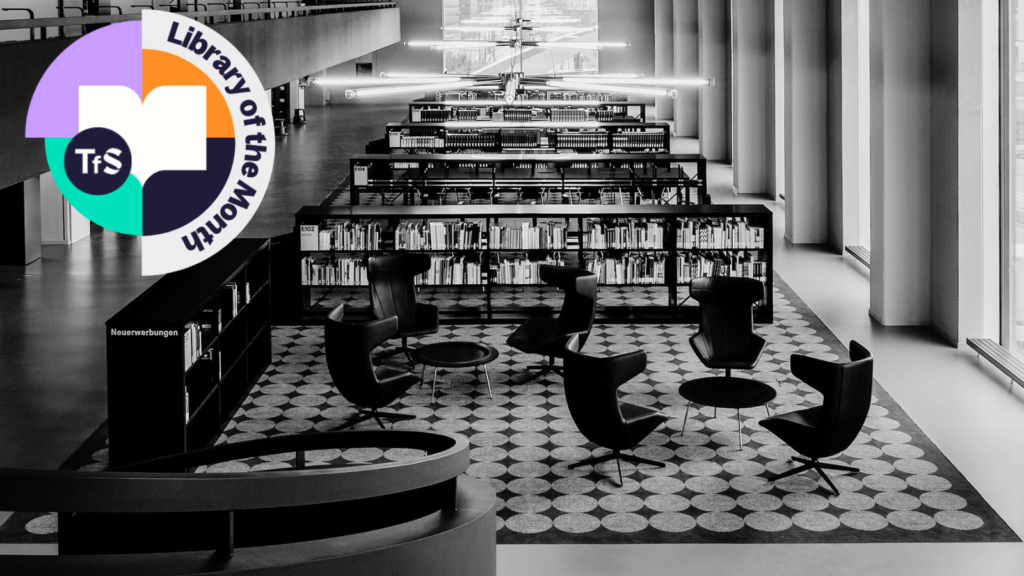
We asked Simone Welti, Library Information Specialist at Zurich University of the Arts to tell us more about the university library and what winning Library of the Month meant to them:
“We have been subscribers to Lean Library since 2020 and development partners for Lean Library Futures since 2021. With Lean Library Futures we hope to increase awareness among our university members of the many great resources they have access to thanks to the library. In addition, by including services such as Lean Library Futures, we are also reassuring members that we are looking at new tools and keeping up to date with the latest technology.
We would like to thank Technology of Sage for choosing us as Library of the Month. We look forward to continuing our collaboration and seeing many new and exciting features in Lean Library Futures.”
Discover our previous winners below:
Could your library be next?
Join us next month to see who’s won.